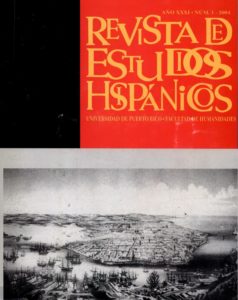Abstract
This paper examines China Hereje 's discourse from the point of view of the picaresque novel. The novel by L.R. Sanchez may be read as a picaresque work because it contains the elements that characterize this genre, especially when dealing with female characters that ineffectively attempt to improve their lot in life by means of their sexuality, wit, and ingenuity. In the case of the baroque "pícaras" their purpose is defeated by their ancestors' ignominious religious conversion and by syphilis; the Puerto Rican "pícaras" present their black skin and marginality as the motives for their failure. On the other hand, the culture that produces the "pícara" is urban, massive and conservative, similar to the social upheaval that arises in a Puerto Rico abruptly industrialized in the mid XX century. In fact, the configuration of a modern lumpenproletariate shares characteristics with the marginal creatures presented in the baroque literature especially in their sense of solitude and individualism.This work is licensed under a Creative Commons Attribution-NonCommercial 4.0 International License.
Downloads
Download data is not yet available.

